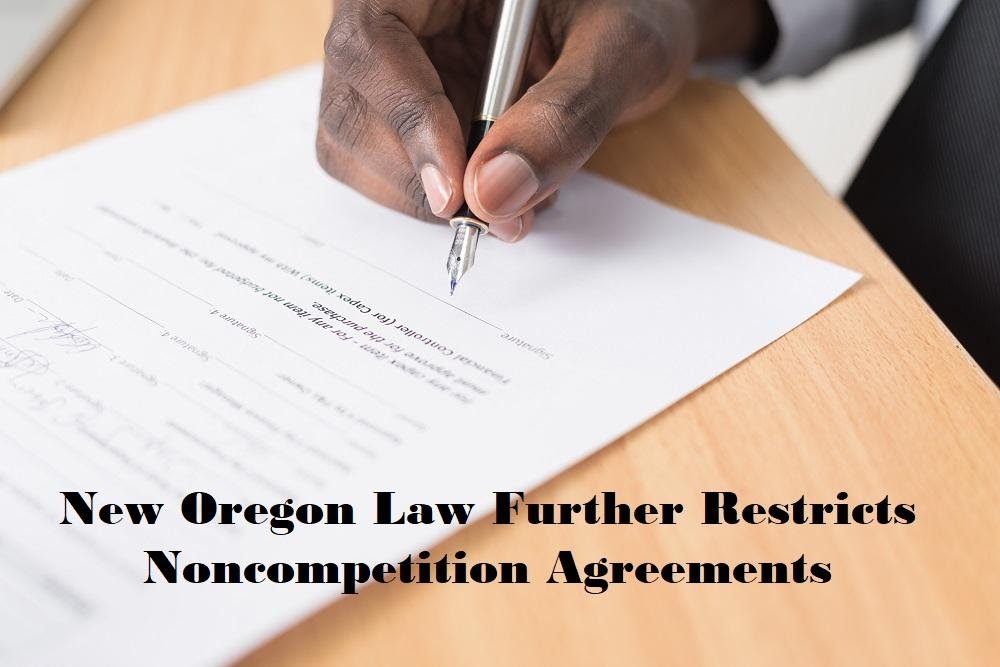Two weeks ago, Oregon Governor Kate Brown signed Senate Bill 169, which modifies Oregon’s statutes relating to noncompetition agreements.
Minimum Salary Requirement
When this new law becomes effective next January, a noncompetition agreement will be void unless the employee makes at least $100,533 a year in gross salary plus commissions. This figure will be adjusted annually for inflation.
Under the current law, the salary and commissions need only exceed “the median family income for a four-person family, as determined by the [U.S.] Census Bureau for the most recent year available at the time of the employee’s separation from service.”
In some cases, an employee can be subjected to noncompetition restrictions despite not earning the minimum salary, but it requires the employer to pay the employee during the restricted period at the rate of 50% of the greater of:
the employee’s salary and commissions at the time of termination or
the required minimum salary (that is, under the new law, $100,533 and under the current law, the median family income for a four-person family)
Maximum Time of Restriction
In addition, the new law provides that the longest valid noncompetition agreement will be 12 months, rather than the current 18 months. Before 2016, a two-year restriction was valid.
Agreements Must Be in Writing
The new law makes clear that noncompetition agreements must be written, not oral or implied, and adds a writing requirement to the exception for those who don’t earn enough salary to be subjected to a noncompetition restriction.
That is, if an employee does not meet the salary requirements, a noncompetition agreement can still be enforced so long as the employer agrees in writing to pay the employee the required amounts for the entire length of the restriction.
Under the law in effect now, the employer is required only to make the payments, not to agree in writing to do so.
Noncompliant Agreements Are Void
Currently, noncompetition agreements that don’t comply with the law are “voidable.” Some courts have interpreted this to mean that an employee must take affirmative action to void a noncompetition agreement that is not in compliance.
In other words, an agreement that doesn’t comply with the law isn’t void unless the employee notifies the employer of the employee’s intent to void the agreement.
Under the new law, agreements that don’t comply with statutory requirements will automatically be void with no action required by employees.
Many Current Restrictions Remain in Effect As-Is
A number of restrictions under the current law will not change, including:
The employer must inform a new employee “in a written employment offer received by the employee at least two weeks before the first day of the employee’s employment that a noncompetition agreement is required as a condition of employment.”
The employer must provide the employee with “a signed, written copy of the terms of the noncompetition agreement” within 30 days after the date of termination of employment.
The employer must have a “protectable interest,” which generally means that the employee either has access to trade secrets or to other “competitively sensitive confidential business or professional information” (there is a special exception for on-air talent with its own set of requirements).
Current employees can enter into a noncompetition agreement only upon a “bona fide advancement.”
The employee must be a white-collar employee, “engaged in administrative, executive or professional work who: (a) Performs predominantly intellectual, managerial or creative tasks; (b) Exercises discretion and independent judgment; and (c) Earns a salary and is paid on a salary basis.”
Note that all of these limitations apply only to noncompetition agreements with employees, not to confidentiality and nonsolicitation agreements.
They also do not apply to bonus restriction agreements, where a loss of a bonus or profit-sharing is the only consequence of an employee breaching a noncompetition restriction. A valid bonus restriction agreement limits the restriction to a reasonable period of time, geographic area, and specified activities.
In addition, the services performed by the employee must include substantial involvement in management of the employer’s business, personal contact with customers, knowledge of customer requirements related to the employer’s business or knowledge of trade secrets or other proprietary information of the employer.
Each state has its own laws dealing with noncompetition agreements, so if you’re not in Oregon, you should determine what the laws are in your state.
Whether you’re an employee or an employer, and whether you’re in Oregon or another state, please feel free to contact us if you have any questions about noncompetition restrictions or any other aspect of employment law.
For more information about employment law, see Employment Law (in Plain English)®, co-authored by members of this law firm. The book is available through Skyhorse Publishing, Amazon, Barnes & Noble, and Bookshop (an online bookstore that allows you to support your favorite independently owned bookstore).
Photo by Cytonn Photography on Unsplash






